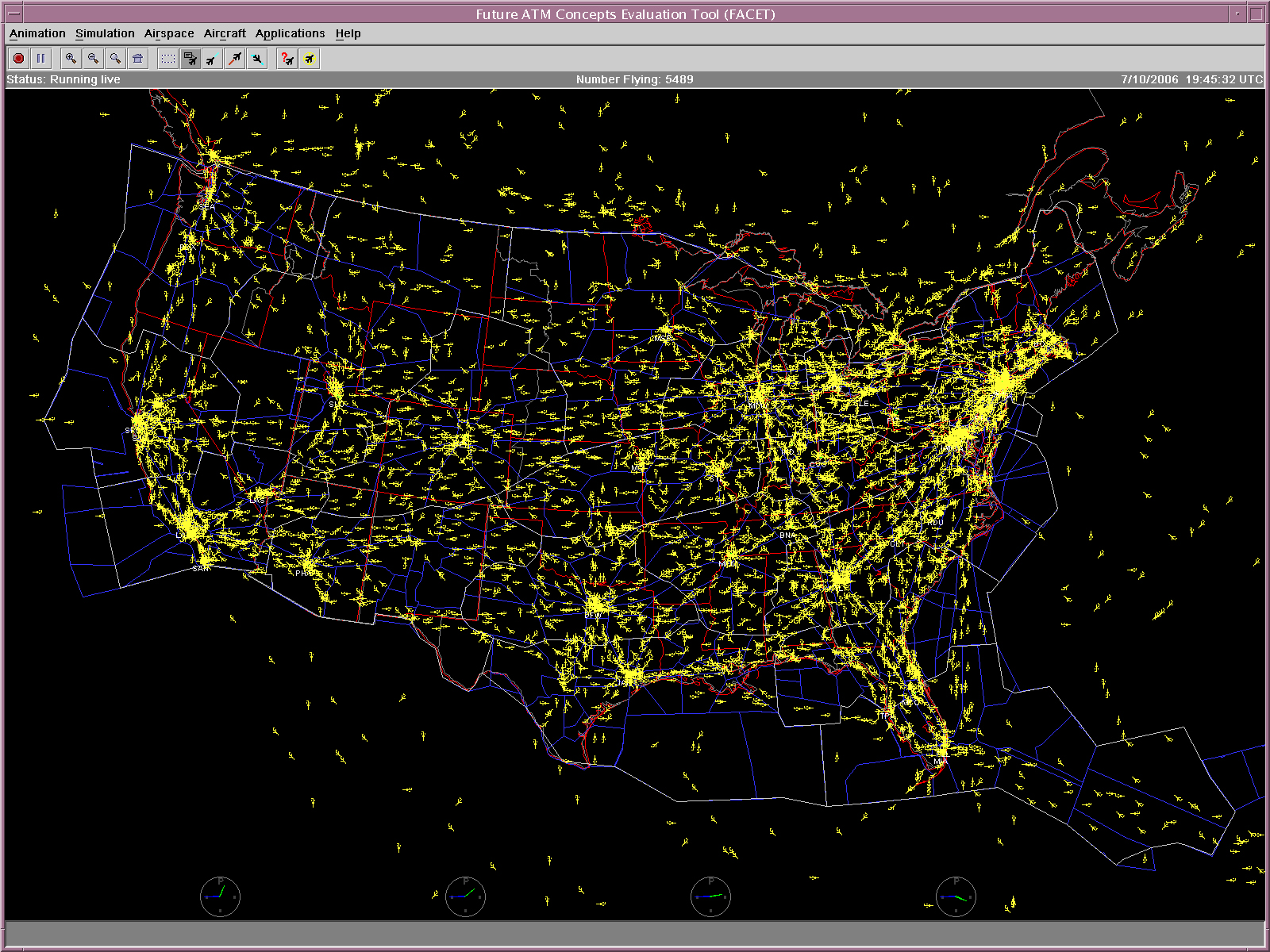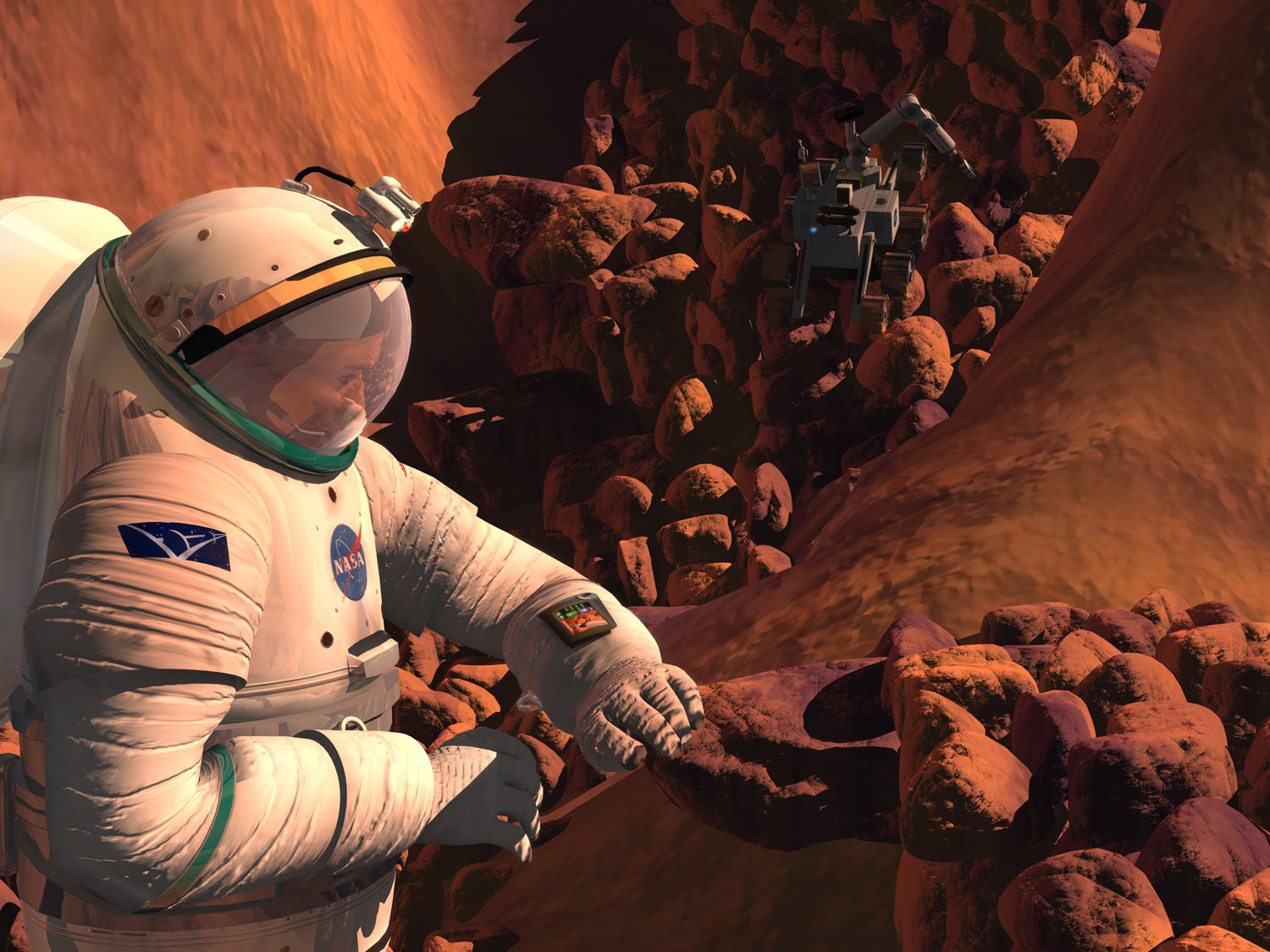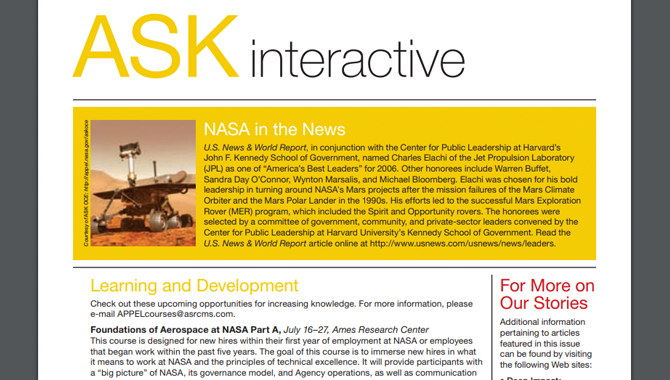By Thomas H. Davenport
A couple of years ago, I assigned a case study on NASA’s approach to knowledge management to several teams of MBA students as a final exam. As part of the exam, the teams were expected to make recommendations for how NASA should revise its approaches to knowledge. One MBA team suggested a major change in direction. Their recommendation went something like this: “NASA should abandon its current systems and approaches to managing knowledge and adopt a series of wikis instead.”
A wiki is a system by which multiple individuals can edit a document over the Internet. It was a relatively new feature at the time, but it is much better known today because of the success of Wikipedia, a publicly edited encyclopedia. I didn’t give these students a high grade. I commented on their paper that, “I’d hate to fly on a Space Shuttle mission with expertise contributed by committee.”
Since then, however, the “democratization of knowledge” has become an influential idea, and wikis, blogs, and social networking software have risen dramatically in popularity. A recent New York Times article described the embrace of these democratic tools by several groups within the U.S. intelligence community. MIT has formed a research center dealing with what it calls “collective intelligence.”
Were my students, then, only a bit ahead of their time? Was I an old fogy and an elitist in resisting this democratic movement? In this article, I’ll consider the tools and management issues driving the democratization of knowledge and speculate a bit on their potential relevance to NASA.
What’s So Good About Knowledge Democracy?
The general idea of making knowledge more democratic has strong appeal for many. It recognizes that knowledge is almost always a social construct and seldom the sole possession of a single brilliant individual. Why not engage the intelligence and expertise of as many people as possible? All of us together are clearly smarter than any one of us.
It’s also an appealing notion that knowledge democracies would eliminate political or hierarchical barriers to knowledge exchange. In a fully democratic organization, everyone’s ideas would be heard and considered. The democratization idea suggests that knowledge will flow more readily around an organization, and the best ideas will float to the top. NASA, of course, has encountered situations in which the broader dissemination of knowledge might have prevented failed missions.
Substantial technology that could yield a more democratic form of knowledge management is now available. Wikis are being considered, for example, for applications such as comments on patent applications. There are more than 80 million Web logs, or blogs, in which individuals express their opinions or personal knowledge in an informal fashion. Social networking software is primarily for social interchange now, but new versions of it are being introduced that allow sharing of business relationships and contacts. “Prediction markets,” such as the Iowa Electronic Markets, are being touted as yielding better predictions of difficult-to-forecast phenomena (most notably, in the case of the Iowa market, the U.S. presidential elections). These technologies could bring an approach to capturing and managing knowledge that is much more democratic and participative than those typically used to manage organizational knowledge.
Alas, however, this utopian vision can hardly be achieved through new technology alone. The absence of democratic knowledge technologies in the past is not the only reason that knowledge is hierarchical in nature. Software and the Internet won’t make organizational hierarchy and politics go away. They won’t make the ideas of the frontline worker in corporations as influential as those of the CEO. Most of the barriers that prevent knowledge from flowing freely in organizations— power differentials, lack of trust, missing incentives, unsupportive cultures, and the general busyness of employees today—would not be addressed by technology alone. For a set of technologies to bring about such changes, it would have to be truly magical, and the tools employed for knowledge democracies fall short of magic.
For NASA, however, a more important issue in moving to a more democratic knowledge environment is the quality of the knowledge itself. NASA is full of experts on various topics, but in any specific knowledge domain some people are more expert than others. It would seem irresponsible to treat all knowledge equally where lives and very large amounts of resources are at stake, as they are on all NASA space missions.
Therefore, I would argue that it is not a good idea for NASA to adopt a fully democratic approach to knowledge, at least under certain circumstances, including situations in which there are clear right answers and where some people are more likely to provide those answers than others. Indeed, on the Internet and in other environments where knowledge creation and distribution have already been democratized (for instance, CB radio and community access television), knowledge quality levels are often degraded.
Some argue that knowledge quality can remain high in a democratic knowledge environment. The most common example given is Wikipedia, the wiki-based encyclopedia. A widely discussed article in Nature—itself usually a source of high-quality knowledge—reported that Wikipedia’s science-oriented entries were not significantly more error-prone than Encyclopaedia Britannica’s, which rely heavily on expert writers and editors. There is more to this story, however. Even Nature found that Wikipedia had 32 percent more errors than Britannica, and in many cases the Nature reporters did not use actual entries from the real Britannica encyclopedia as the basis for comparison. For example, one entry they used consisted of several excerpts from Britannica entries strung together with text written by the Nature reporters; another came from a Britannica encyclopedia for children. While many democratically minded observers have used this comparison to support a more democratic knowledge management approach, I believe that it supports the opposite conclusion—that experts provide a higher quality of knowledge than the general public.
Finally, there are some who argue that these democratic and socially oriented tools can be used to distribute knowledge by experts. Why not, as some have suggested, get experts to write blogs on NASA’s intranet (or even the public Internet)? While this approach is certainly possible, and some companies I have encountered do employ it, I don’t believe it’s very helpful. There are already many tools for distributing the knowledge of experts—from corporate portals to online expertise directories to printed books. The power of social media is their social nature; it is, I believe, a misuse of those tools to restrict them to experts.
When Are Democratic Approaches Appropriate?
Under what circumstances, then, might it be feasible and even desirable to use these social and democratic tools? One fairly obvious set of conditions would be when there is no right answer but only opinions as to the best alternative. A debate on which U.S. presidential candidate might provide the greatest level of support for manned space travel, for example, would seem to be well-suited to a series of blogs and online discussions.
Democratic approaches may also be useful to debate questions (again, that have no right answer) when broad participation and commitment by affected parties is necessary for success. Organizations that care deeply about employee satisfaction, for example, might use blogs, wikis, or discussion databases to debate changes in human resource management policy. This participative approach would seem especially relevant to organizations like NASA where there are high percentages of well-educated knowledge workers.
Another setting well suited to democratic knowledge is when there is a correct answer, but the knowledge needed to elicit it is equally distributed among a population. In The Wisdom of Crowds, James Surowiecki refers to the frequent contests in which many individuals guess how many jellybeans (or other small objects) there are in a large jar. No individual knows the correct answer, but all are equally qualified to guess. In such situations, Surowiecki reports, guesses will vary widely, but the average of all the guesses is likely to come close to the correct number. One hopes that NASA usually has better means for coming up with an answer, however.
This “averaging” approach can also work when experts are the opinion holders. Individual expert predictions are often wrong, but collectively they can be impressively perspicacious. Law professor Cass Sunstein points out in Infotopia: How Many Minds Produce Knowledge that while an individual economist may not accurately predict economic growth every year, the average of a number of economists’ growth predictions is usually quite accurate.
Another (possibly more useful) approach for democratic knowledge at NASA is in situations where a non-accountable opinion may be more honest or accurate than those who are accountable for an outcome. Some corporations (Hewlett-Packard, for example) have experimented with “opinion markets” to predict sales performance based on multiple opinions; accountable salespeople may be likely to overestimate the likelihood of a particular sale. Pharmaceutical firms use the same tool to predict the likelihood that a drug compound will receive FDA approval. NASA might employ opinion markets to anticipate the likelihood of a mission failure.
Finally, democratic approaches to knowledge can work well when the goal is only an approximate, convenient answer. Google, for example, employs a democratic approach to deciding what Web page you are seeking when you do a search. It ranks pages primarily on the basis of the degree to which other pages have linked to a page. The page-ranking algorithm may yield the site you seek, but it is usually just an approximate result. Similarly, while Wikipedia may have a lower definition accuracy level thanEncyclopaedia Britannica, the wiki-based encyclopedia is free and convenient to use, and it usually provides a generally correct answer.
Choosing the Right Approach
There are, then, a number of settings in which democratic knowledge tools can provide an accurate or useful answer. But these are by no means the only settings in which organizations have a need for knowledge. NASA and other organizations seeking to manage knowledge and improve knowledge work need to analyze and diagnose the setting in which knowledge will be used before deciding on any particular technology to facilitate the process.
There is little doubt that democratic knowledge technologies should be employed to augment the more traditional, accepted approaches to creating, gathering, refining, and distributing knowledge. However, they should not be viewed as a panacea for NASA nor as the only useful tool in the knowledge toolbox.









